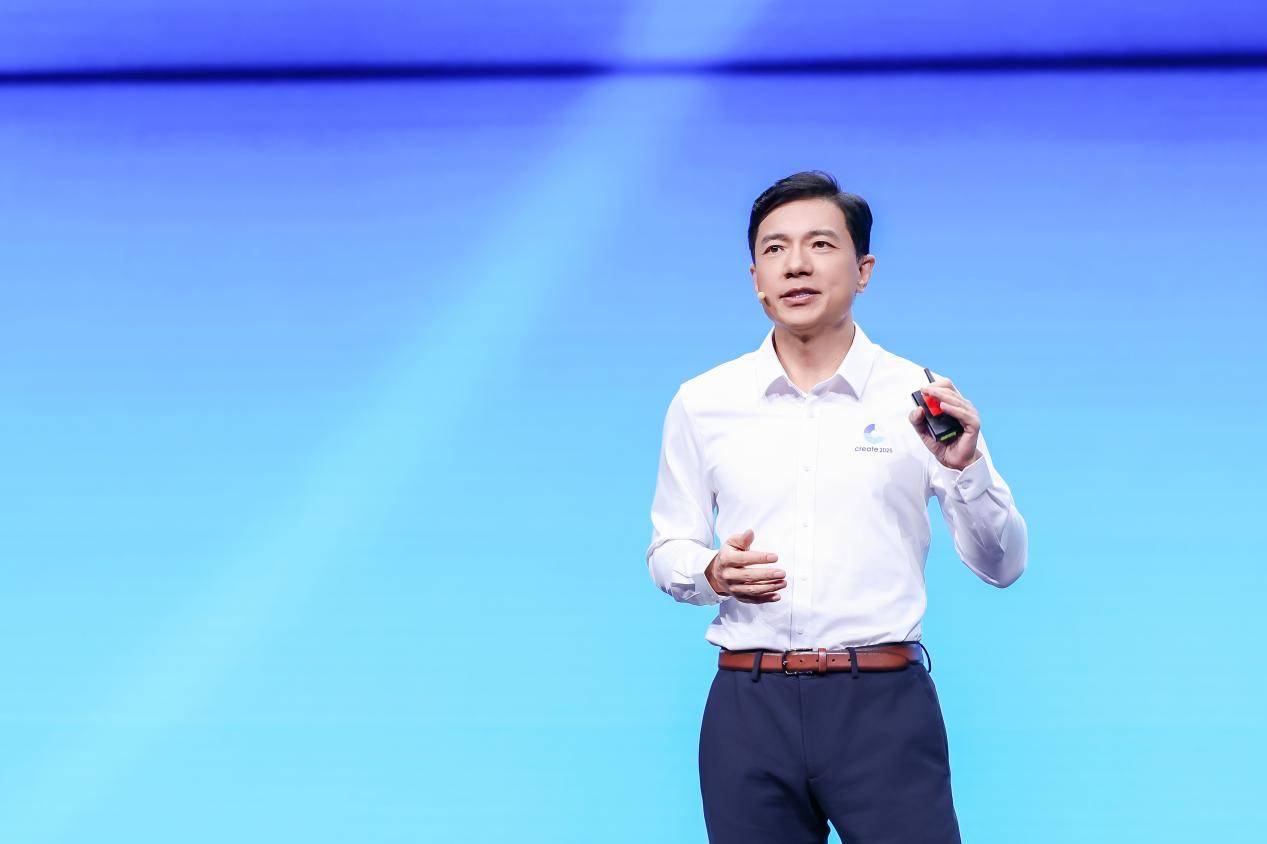Baidu Releases Two Major New Models and Multiple AI Applications to Help Developers Fully Embrace MCP

Image Source: Baidu
In 2025, when the iteration speed of AI technology far exceeds expectations, a core question facing developers and enterprises is: how to avoid the application value being submerged by the technological wave when model capabilities leap forward rapidly?
Baidu provided an answer at the Create Developer Conference on April 25. At the conference, the Wenxin Large Model 4.5 Turbo and X1 Turbo were officially unveiled, along with the launch of the Cangzhou OS content domain operating system, and the general super-intelligent agent app "Xinxiang" is now online. While showcasing breakthroughs in technology, Baidu also responded to the industry's eager expectations for the practical value of AI with a comprehensive layout of scenario-based applications and the MCP (Model Context Protocol) ecosystem.
Li Yanhong told developers on-site, "As long as you find the right scenario, choose the right foundational model, and sometimes learn a bit about model tuning methods, the applications developed on this basis will not become outdated." He emphasized, "Without applications, chips and models have no value. There will be many models, but what will truly dominate this world in the future is applications; applications are the king."
Wenxin Large Model 4.5 Turbo: Multimodal, Low Cost, Strong Reasoning
Currently, the competition among AI large models has entered a white-hot stage, but issues such as single modality, reasoning hallucinations, and high operational costs still plague the industry. To address these pain points, Baidu launched the Wenxin Large Model 4.5 Turbo and X1 Turbo, which focus on multimodal capabilities, low cost, and strong reasoning as core features, demonstrating a balance between technology and cost-effectiveness.
Wenxin 4.5 Turbo has made further breakthroughs in multimodal capabilities, with faster speeds and significantly lower prices—only 0.8 yuan per million tokens for input and 3.2 yuan for output, which is as low as 40% compared to DeepSeek-V3. In multiple benchmark tests, 4.5 Turbo surpassed GPT-4o with an average score of 77.68 compared to 72.76, showcasing its competitiveness. The X1 Turbo goes even further, based on deep thinking optimizations of 4.5 Turbo, with an input cost of 1 yuan and an output cost of 4 yuan per million tokens, only 25% of DeepSeek-R1, performing leadingly in scenarios such as Q&A, creation, logical reasoning, and tool invocation.
Li Yanhong stated on-site, "Model iteration is fast, but application value will not be overshadowed. As long as you find the right scenario, choose the right model, and make good use of tuning, AI applications can continuously create value." This viewpoint injected a strong dose of confidence into developers—the true value of large models lies in their deep integration with scenarios.
If the Wenxin Large Model is the "heart" of Baidu AI, then the newly released Cangzhou OS is the "nervous system" connecting content and applications. As a content operating system, Cangzhou OS centers around Chatfile Plus, integrating a public knowledge base, a private knowledge base, and a memory base, along with a reader, editor, and player, achieving multimodal content parsing and processing through dynamic calls from large models.

Cangzhou OS | Image Source: Baidu
Leveraging Cangzhou OS, Baidu Wenku and Baidu Cloud jointly launched the "AI Notes" feature. Users can generate structured notes, AI mind maps, and even generate test questions based on video content with one click while watching videos in the cloud, achieving seamless linkage between videos and notes. As of now, the number of paid users for Baidu Wenku's AI features has exceeded 40 million, with monthly active AI users reaching 97 million; Baidu Cloud's monthly active AI users exceed 80 million. This data not only reflects the productivity of Cangzhou OS but also indicates the enormous potential of AI applications in the content domain.
Another application of multimodal capabilities is Baidu's high-persuasion digital human. In e-commerce live streaming scenarios, traditional digital humans often have dull scripts and stiff movements, while Baidu's high-persuasion digital human achieves hyper-realistic voice and appearance, professional content, and flexible interaction through a multimodal large model. Its "script generation" feature can adjust expressions, tone, and actions in real-time based on the script, while the "AI brain" can dynamically schedule roles such as co-hosts and scene controllers based on the live stream's popularity, truly achieving "one person as a team." Baidu's Huibo Star platform also launched a "one-click clone" feature, allowing users to generate a personalized digital human by simply uploading a 2-minute video, making "everyone can be a host" a reality.
Agents and MCP: Igniting the Ecological Engine of AI Applications
As Agents become a hot topic in the industry, Baidu has also launched the "Xinxiang" App to join the fray.
As a product centered around the "AI task completion engine," Xinxiang breaks down, executes, and delivers complex tasks through natural language interaction. Currently, Xinxiang covers over 200 tasks across more than ten scenarios, including deep research, smart charts, and game development, with plans to expand to over 100,000 in the future.
Xinxiang supports a "multi-agent collaboration" mechanism. In health consultation scenarios, the system can schedule multiple "doctor AI avatars" for joint consultations; in legal services, a "lawyer think tank" collaborates to respond. This mechanism breaks through the limitations of traditional tool invocation, providing more efficient solutions for professional scenarios. The free availability of Xinxiang and the launch of its Android version (with the iOS version coming soon) also allow more users to experience the charm of AI agents.
The potential of multi-agent collaboration is also reflected in Baidu's no-code programming tool "Miaoda" launched last year. "Miaoda" can generate applications with a single sentence, coordinating multiple agents such as product managers, architects, and designers, and invoking tool components like cloud storage, databases, and map navigation. Using "Miaoda," a university student team developed a marketing tool that previously took a week in just a few minutes, with a model invocation cost of only 5 yuan.
Li Yanhong stated, "There are 8 billion people in the world, and when the technical threshold disappears, everyone can have the ability of a programmer." The societal openness of "Miaoda" further lowers the development threshold for AI applications.
MCP (Model Context Protocol) is a new trend in the AI ecosystem, reshaping the interaction between developers and large models. At this conference, Baidu announced its full embrace of MCP, launching the world's first e-commerce transaction MCP, search MCP, and other services, while optimizing the capabilities of the Wenxin Large Model in MCP task planning and scheduling.
At the same time, Baidu Smart Cloud's Qianfan platform has taken the lead in being compatible with MCP, supporting developers in creating and publishing MCP servers; Baidu Search has built an MCP server discovery platform, indexing high-quality services across the web; Wenxin Quick Code has become the first intelligent coding assistant in China to support MCP servers. Additionally, applications like Baidu Wenku, Cloud, and Maps have fully opened MCP server services, while the MCP services launched by Baidu E-commerce cover functions such as product search, transactions, and parameter comparison, becoming the first MCP service in China to support e-commerce transactions. This series of layouts not only lowers the access threshold for developers but also injects new momentum into the prosperity of the MCP ecosystem.

Baidu "Wenxin Cup" Entrepreneurship Competition Launched | Image Source: Baidu
In addition to breakthroughs in technology and products, Baidu has also invested significantly in AI talent cultivation and entrepreneurial support. The 5-year plan to cultivate 5 million AI talents has been completed ahead of schedule, and Li Yanhong announced at the conference that Baidu will cultivate another 10 million AI talents in the next five years. Furthermore, the third "Wenxin Cup" entrepreneurship competition has raised the maximum investment amount for a single project to 70 million yuan, providing stronger support for entrepreneurs.
On the hardware front, Baidu has lit up the first fully self-developed 30,000-card cluster in China, capable of simultaneously carrying out training for multiple large models with hundreds of billions of parameters and supporting 1,000 customers in fine-tuning models with billions of parameters. This cluster ensures the stability and energy efficiency of training tasks with high-performance networking and innovative cooling solutions.
The technology matrix released by Baidu reveals three major trends in AI development: multimodality becoming a foundational capability (Wenxin Large Model), agents reconstructing human-machine collaboration (Xinxiang App), and the MCP protocol unifying service interfaces (Baidu MCP ecosystem). As model capabilities break through thresholds, tool invocation achieves standardization, and computing costs continue to decline, a new era of AI applications is on the horizon. As Li Yanhong stated, "AI applications that can penetrate scenarios and bring real value are the true opportunities for developers."
"All these releases are aimed at allowing developers to not worry about model capabilities, not worry about model costs, and certainly not worry about development tools and platforms, so they can focus on creating applications and making the best applications," Li Yanhong stated on-site.
For the domestic AI industry, Baidu's series of actions not only showcases its technical strength but also reflects a profound insight into scenario-based applications and ecological collaboration. In this transformation, Baidu is paving a "highway" for developers from models to applications through technological innovation and ecosystem construction. With the continuous iteration of the Wenxin Large Model, Cangzhou OS, and Xinxiang, the "super productivity" of AI may soon be truly integrated into everyone's work and life.
免责声明:本文章仅代表作者个人观点,不代表本平台的立场和观点。本文章仅供信息分享,不构成对任何人的任何投资建议。用户与作者之间的任何争议,与本平台无关。如网页中刊载的文章或图片涉及侵权,请提供相关的权利证明和身份证明发送邮件到support@aicoin.com,本平台相关工作人员将会进行核查。



